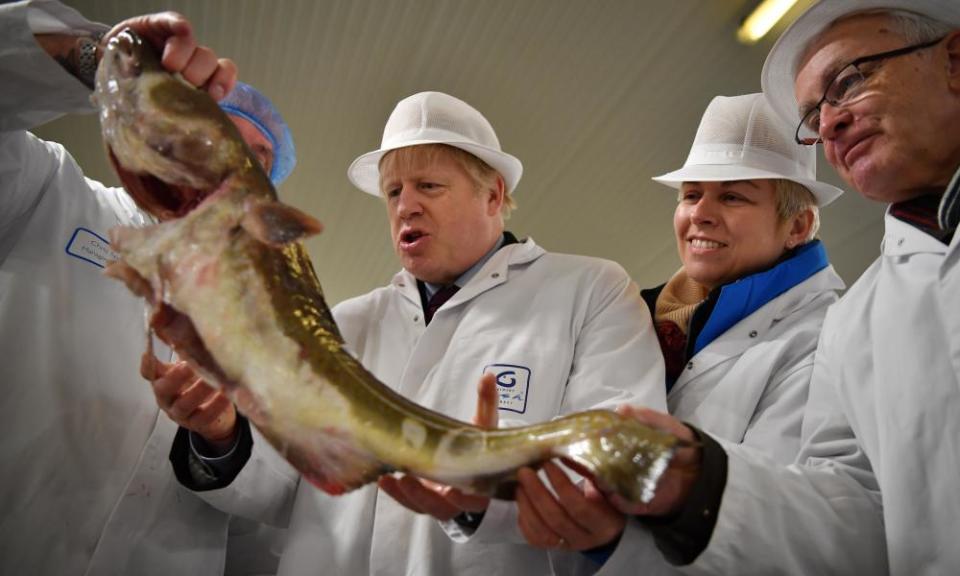Boris Johnson must give up on fishing: it's the only way to get a Brexit deal

Hold the fish. But has Boris Johnson the guts to do it? If one thing screams from the current, final trade talks between Britain and the European Union, it is that fishing cannot become a deal-breaker. It is an industry alive with romance, but it occupies just 0.02% of the British domestic output and employs just 12,000 people, fewer than benighted Debenhams.
Related: Brexit: UK has lowered demands on fish catches, says EU
The reality is that British negotiators have proved so incompetent in the talks so far – playing hard and soft throughout as if it were a poker game – that the EU now has all the cards in its hand.
Messages emerging from the Brexit talks indicate that two of the last three “blockages” have reached plausible solution. Britain’s fantasy that it could go on trading freely with Europe while subsidising its competition and disregarding EU standards on health and welfare has been overridden. Only fish remains. And while the nuances of level playing fields may be beyond the pay grade of many French, Dutch and Spanish politicians, they all know a lobster and a cod. They also know the benefits their fleets have enjoyed at Britain’s expense under existing EU quotas.
Britain in this matter is in the right. For Channel cod the British quota is 9% against France’s 84%, and other fish likewise. Its territorial waters are plundered by European fishing fleets and it is currently demanding the “return” of only 60% of that plunder. The EU has offered just 18% – a huge gap. Various bridges have been devised, such as annual quota renegotiation or a phased transition towards the British position. None has proved acceptable.
The reality, which Britain refuses to admit, is that Brexit is not about rectitude but power. In Washington, president-elect Joe Biden said this week that he has no interest in an urgent trade deal with Britain, but rather that he must concentrate on his own economy. Likewise, the EU is more concerned with recovering from coronavirus than worrying over Johnson’s self-inflicted Brexit wounds.
France’s President Macron has no desire to add to his internal problems just now, and certainly no interest in upsetting his fishermen. He says he is ready for no deal with Britain, and is happy to discuss trade into the new year, even as pandemonium breaks out at the Strait of Dover and in Britain’s supermarkets and pharmacies. The French are rubbing hands with glee at Johnson’s plight.
Every official assessment of Brexit shows no deal (and indeed most sorts of deal) to be disastrous. There must be a deal. But the issue is Johnson. On what should be the central issue of this week’s talks – minimising Brexit’s cost through sustaining open-border trade – he is vulnerable to the charge of lying. He and Theresa May both promised a Brexit that would be “frictionless”. Of all Johnson’s whoppers this was the most outrageous, as it was untrue from the moment he insisted on leaving the customs union. The insistence had no purpose except in helping him become his party’s leader. It was a classic case of pre-emptive narcissism.
Johnson not only knew that frictionless was impossible, he then proved it by his concession last year to the Irish government on a border down the Irish Sea. That border remains floating in agonised suspension: it will be explosive with no deal. Meanwhile, we have the Brexit supremo, Michael Gove, issuing 208-page exporters’ manuals and posting frantic advertisements warning the country “to get prepared” for his regulatory tsunami. Anyone who thinks this does not constitute friction should tune into Radio 4’s early-morning horror show, Farming Today.
By conceding on fish, Johnson could just about salvage a deal. He could order Gove to rescue some sanity from the Brexit shambles. He would have to shower his fishermen with millions of pounds. But he could proclaim tariff-free trade and avoid too much disruption to business with Europe. This would protect financial services, security liaison, science, academic ties and a hundred other dealings between Britain and its European neighbours.
The government can then struggle to bring Britain back into a sensible relationship with Europe’s community of states, at a time when that community needs sober co-operation, not comic-book boosterism. We could surely move on from ministers such as Matt Hancock claiming vaccines for Brexit, and Gavin Williamson pretending these proved Britain to be “a much better country” than everywhere else. Britain’s current vaccines were invented in the United States and manufactured in Belgium.
Deal or no deal, Britain will next week learn what Brexit really means. It means impotence. The country will have chosen between a minor humiliation over fish or the catastrophe of the EU states walking away from the table with no deal at all.
Either way, Britain will have declined under Johnson’s command from being a leading member of one of the world’s three great politico-economic blocs to being an irrelevant presence off the coast of one of them. It will have been forced to accept a miserable fishing deal by its neighbours or it will have imposed on its already battered citizens the savage economic sanction of a tariff wall.
The talk of Whitehall is that Johnson is still not fully fit to govern. He has shown a startling lack of grip on his Downing Street team since the summer, with chaotic comings and goings worthy of Donald Trump’s White House. With the virtual collapse of his coronavirus track-and-trace strategy, and constant changes in lockdown policy, he must know that the efficient wheeling out of Covid vaccinations is now his absolute priority. Fishing is not.
• Simon Jenkins is a Guardian columnist

 Yahoo Finance
Yahoo Finance 